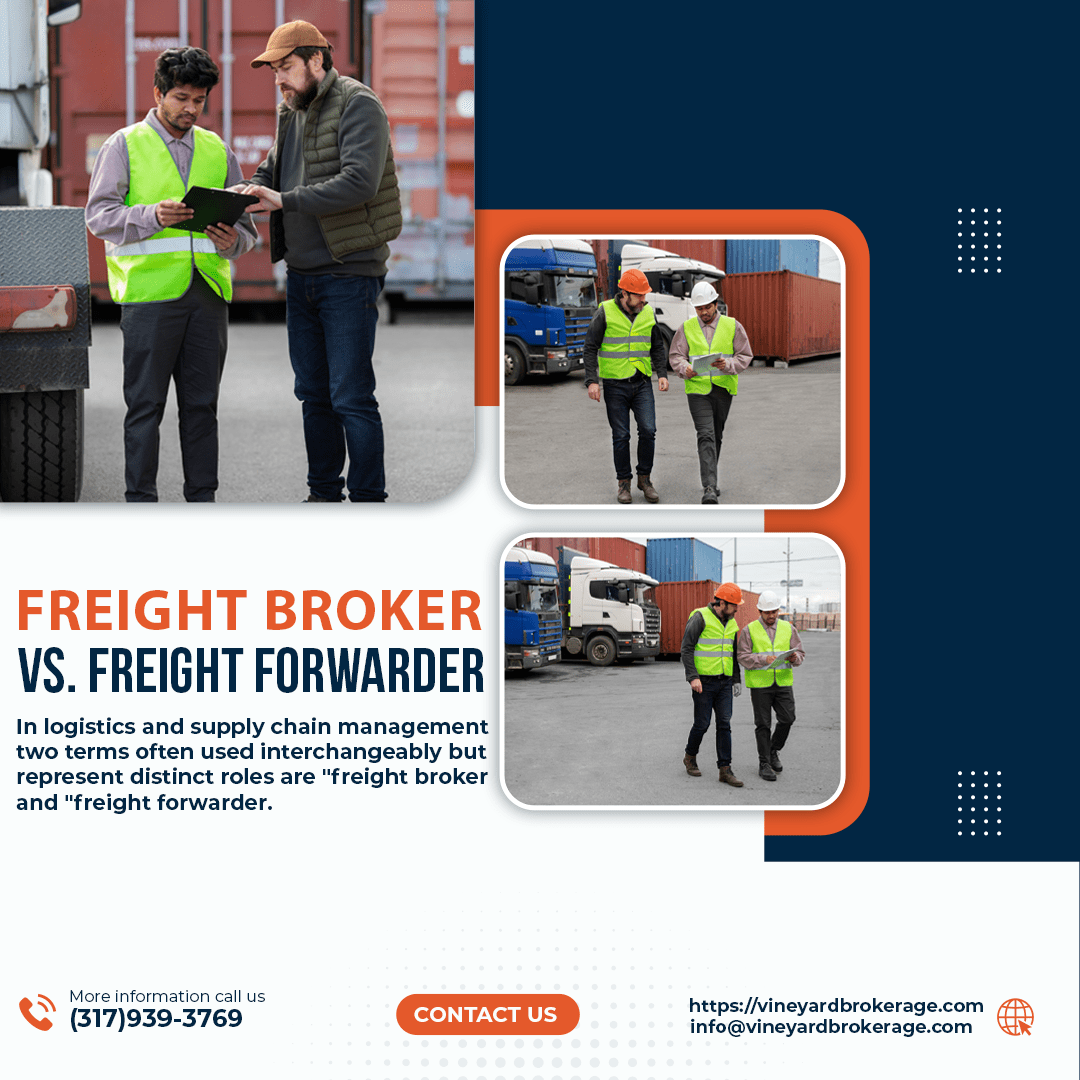Freight Broker vs. Freight Forwarder: Understanding the Differences

In logistics and supply chain management, two terms often used interchangeably but represent distinct roles are “freight broker” and “freight forwarder.” Both play pivotal roles in transporting goods, yet their responsibilities and functions differ significantly. In this comprehensive blog, Vineyard Brokerage, we’ll delve into the key differences between freight brokers and freight forwarders—shedding light on their unique roles and how they contribute to the seamless movement of goods worldwide.
Freight Broker: The Middleman
A freight broker is a middleman connecting shippers (those looking to transport goods) with carriers (truckers, shipping companies, or other transportation providers). They do not take ownership of the goods but facilitate the transportation process. Here are some critical aspects of a freight broker’s role:
- Matchmaking: Freight brokers act as intermediaries by matching shippers with carriers with the capacity and availability to transport the cargo. This involves finding the most suitable carrier for a particular shipment.
- Logistics Expertise: Brokers possess knowledge of transportation logistics, which includes understanding routes, rates, and various modes of transportation. This knowledge enables them to provide valuable advice to both shippers and carriers.
- Negotiation: They negotiate freight rates on behalf of the shipper, striving to secure the best deal for the client. Conversely, they negotiate with carriers to ensure they are adequately compensated for their services.
- Documentation: Freight brokers handle the necessary documentation for shipments, including bills of lading, invoices, and other relevant paperwork. This ensures that the cargo moves smoothly and is compliant with regulations.
Freight Forwarder: The Logistics Facilitator
On the other hand, a freight forwarder takes on a more comprehensive role in the shipping process. They coordinate the entire logistics chain, from the point of origin to the final destination. Here’s a closer look at the role of a freight forwarder:
- End-to-end Coordination: Freight forwarders manage the entire logistics process, which includes organizing transportation, warehousing, and the handling of customs clearance. They are in charge of managing the entire supply chain.
- Single Point of Contact: Shippers typically deal with the freight forwarder as a single point of contact. The forwarder is responsible for ensuring that the cargo reaches its destination on time.
- International Expertise: Freight forwarders are specialists in international shipping, dealing with the complexities of customs procedures, import/export regulations, and documentation required for cross-border trade.
- Multi-Modal Solutions: They offer multi-modal transportation solutions, which means they can coordinate shipping by land, sea, and air, often combining these modes for the most efficient and cost-effective route.
- Cargo Consolidation: Freight forwarders often consolidate shipments from multiple shippers into one container to optimize space and reduce costs.
Critical Differences Between Freight Brokers and Freight Forwarders
- Ownership of Cargo: The most significant difference is that freight brokers do not take ownership of the cargo. In contrast, freight forwarders often assume temporary ownership of the goods during logistics.
- Responsibility and Liability: Freight brokers are intermediaries who arrange transportation but are not responsible for the cargo. Freight forwarders have more significant responsibilities and often carry liability for the shipment.
- Scope of Services: Freight brokers specialize in connecting shippers and carriers and may only be involved in some aspects of the shipping process. Freight forwarders provide comprehensive logistics services, including handling cargo from start to finish.
- Documentation: Freight brokers handle essential shipment documentation, while freight forwarders manage extensive international shipping and customs documentation.
- Regulatory Compliance: Freight forwarders are experts in international regulations and customs procedures. Freight brokers primarily focus on domestic transportation.
- Customization: Freight forwarders offer more tailored solutions for complex shipping needs, including managing multi-modal transportation and addressing specific logistical challenges.
Conclusion
In logistics, it’s crucial to understand the distinctions between freight brokers and freight forwarders. While both are essential in transporting goods, their responsibilities and services differ. Freight brokers are intermediaries connecting shippers with carriers, whereas freight forwarders are logistics facilitators who manage the entire supply chain process.
The choice between a freight broker and a freight forwarder depends on the specific needs of a shipper. If you’re looking for a more hands-on, end-to-end solution for international shipping, a freight forwarder is likely the better option. On the other hand, if you need assistance with matchmaking carriers for domestic transportation, a freight broker may be the right choice. Understanding these distinctions is critical for businesses to make educated decisions and guarantee that their goods arrive safely.

